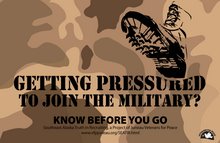MAGGIE MARTIN
Huffington Post Posted: 04/13/11 08:25 PM ET
It has been nearly five years since I left the Army and still my time in the service is fresh in my mind. I think about my deployments every single day without fail. I have friends and family, responsibilities and passions that keep me moving, but the time I spent in the Army and in Iraq are what continue to define me.Many current and former service members feel the same way. The act of participating in war casts a shadow over everything else in life. Facing high stress and danger for so long makes it tremendously difficult to leave the military and rejoin civilian society. Day-to-day concerns seem trivial compared to the life or death urgency of military situations. When I first came home, I would become furious at how easily everyone in this country can carry on virtually ignoring the fact that we are at war.
I worked as a server as I used my GI Bill benefits to earn a bachelor's degree in English Communication, but after graduating with honors, I could not find a job in my field. After a year of looking for meaningful employment, I enrolled in graduate school largely out of fear that my degree would become obsolete before I could even get a shot at any real work experience. The fact that women veterans are among the highest unemployed populations leaves me with questions about whether my service is continuing to hurt me in ways I cannot even see. Read more
Maggie Martin served as a Sergeant in the US Army Signal Corps, and she served two tours in Iraq. She is an organizer with Iraq Veterans Against the War's Operation Recovery Campaign and the Warrior Writers project. Maggie is presently a graduate student at Marygrove College in Detroit, Michigan, and her poetry has been published in Fellowship Magazine.
